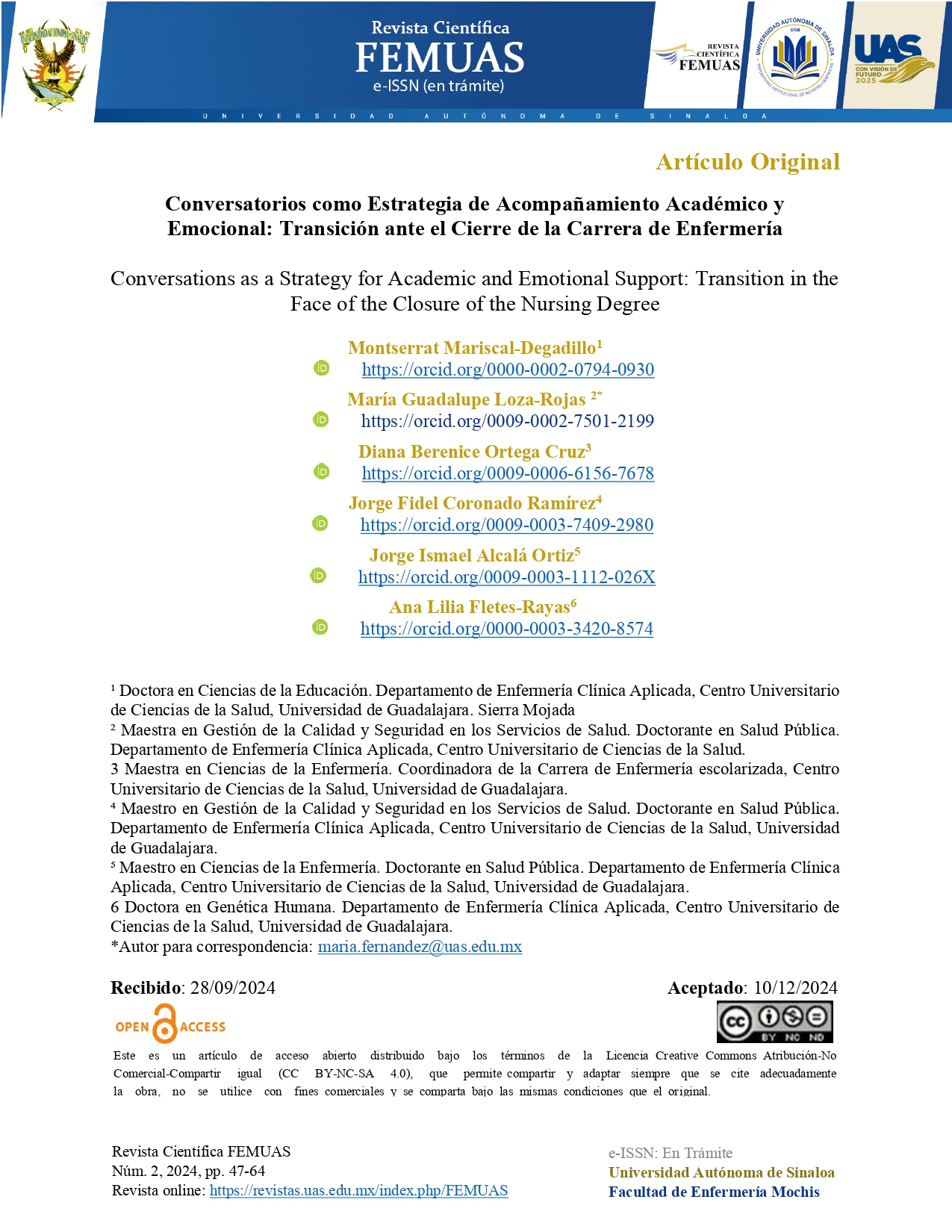Conversations as a Strategy for Academic and Emotional Support: Transition in the Face of the Closure of the Nursing Degree
Keywords:
Tutoría académica, enfermería, deserción escolarAbstract
Academic tutoring is essential to support students in their university career, addressing both their academic and personal needs. The conversations provide a space for dialogue and reflection, allowing students to express their concerns and receive guidance. Objective: To describe the impact of the conversations as a strategy for academic and emotional support. Methodology: The methodological design of the study is mixed, combining quantitative and qualitative approaches to evaluate the impact of the conversations on the academic and emotional experience of 216 students. Questionnaires were applied before and after the sessions to measure perceptions about the tutoring support, complemented by qualitative analysis of the discussions during the conversations. Results: Before the intervention, there was a high level of demotivation and concern among students regarding their academic and work future. The predominant emotions included uncertainty and fear of the program closing. However, after the implementation of the conversations, an improvement in the perception of the support received was observed, suggesting that this strategy may be effective in mitigating emotional concerns and fostering a more conducive environment for learning. Conclusion: The conversations as an integral strategy in the educational process, highlighting their potential to improve not only academic performance, but also the emotional well-being of students in adverse situations.
Downloads
References
Agudo, M. y Suárez, R. (2007). La importancia de los espacios de diálogo en la construcción de conocimiento. Editorial X.
Álvarez González, M. (2017). Hacia un modelo integrador de la tutoría en los diferentes niveles educativos. Educatio Siglo XXI, 35(2), 21-42.
ANUIES (2020). Tutoría en la educación superior: retos y perspectivas. Asociación Nacional de Universidades e Instituciones de Educación Superior.
Cajigal, E., Arias, L., & Farfan, E. R. (2022). Resiliencia y deserción escolar: Un estudio para plantear estrategias desde la tutoría en la educación superior. CPU-e, Revista de Investigación Educativa, 34, 199-223. https://doi.org/10.25009/cpue.v0i34.2794
Cárdenas Castro, M. (2009). Diseños de investigación en ciencias sociales. Ediciones CIESPAL.
Carrillo, M., Padilla, J., Rosero, T., & Villagómez, M. S. (2009). La motivación y el aprendizaje. ALTERIDAD. Revista de Educación, 4(2), 20-32.
Castro Ramírez, B., & Rivas Palma, G. (2006). Estudio sobre el fenómeno de la deserción y retención escolar en localidades de alto riesgo. Sociedad Hoy, 11, 35-72.
ENADIS. (2017). Encuesta Nacional sobre Discriminación en México.
Garaigordobil, M. (2007). Perspectivas metodológicas en la medición de los efectos de un programa de intervención. Apuntes de Psicología, 25(3), 357-376.
Martínez Clares, P., et al. (2020). La tutoría universitaria vista por sus alumnos: propuestas de mejora. Revista de la Educación Superior, 49(195), 55-72.
Maslow, A. H. (1956). Motivación y personalidad. Nueva York: Harper & Row.
Molina, E. (2022). Resiliencia y deserción escolar: Un estudio para plantear estrategias desde la tutoría en la educación superior. CPU-e, Revista de Investigación Educativa, (34),1-20. https://www.academia.edu/115820072/Resiliencia_y_deserci%C3%B3n_escolar_Un_estudio_para_plantear_estrategias_desde_la_tutor%C3%ADa_en_la_educaci%C3%B3n_superior
Ochoa, M. y Gómez, L. (2019). Innovación educativa en contextos desafiantes: el caso de los conversatorios en la Universidad Nacional Autónoma de Chiapas. Revista Latinoamericana de Educación.
Terraza, W. (2019). Estrategias de retención estudiantil en educación superior y su influencia en la deserción. Revista Electrónica Educare, 23(1), 1-15. https://www.redalyc.org/journal/5739/573960911005/
UNESCO. (2017). Education for Sustainable Development Goals: Learning Objectives. UNESCO Publishing.

Downloads
Published
Issue
Section
License
Copyright (c) 2024 Revista Científica FEMUAS

This work is licensed under a Creative Commons Attribution-NoDerivatives 4.0 International License.

